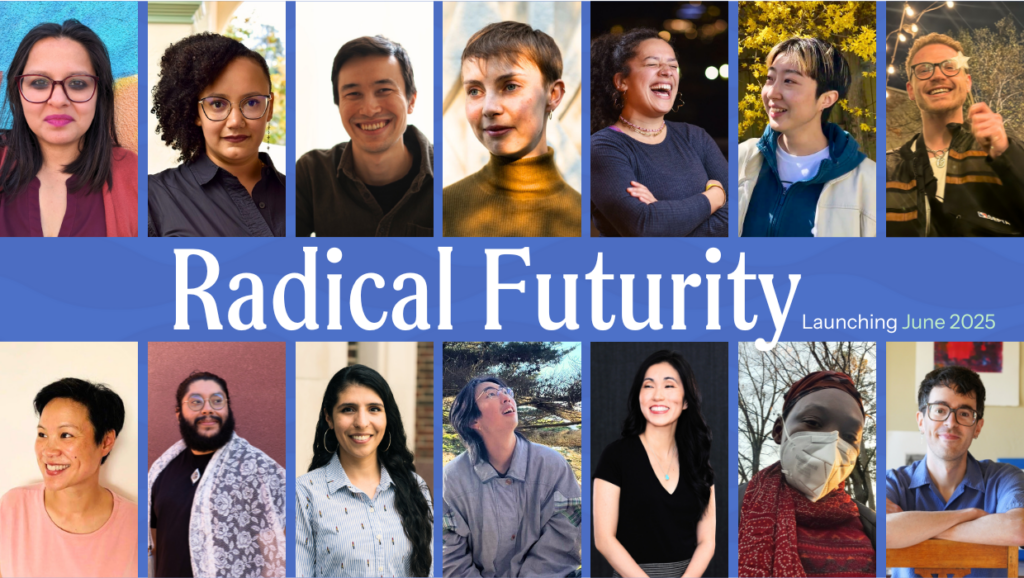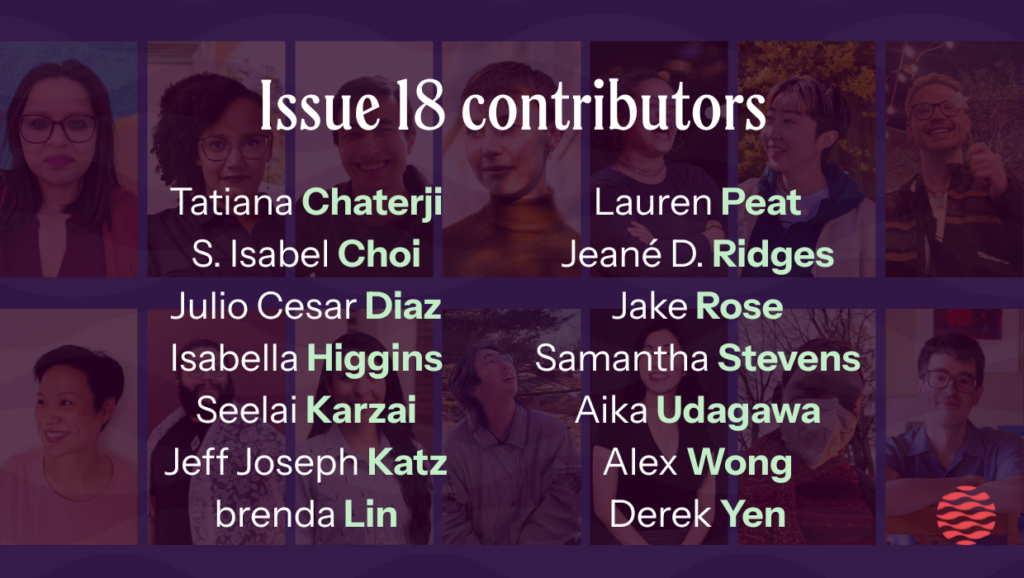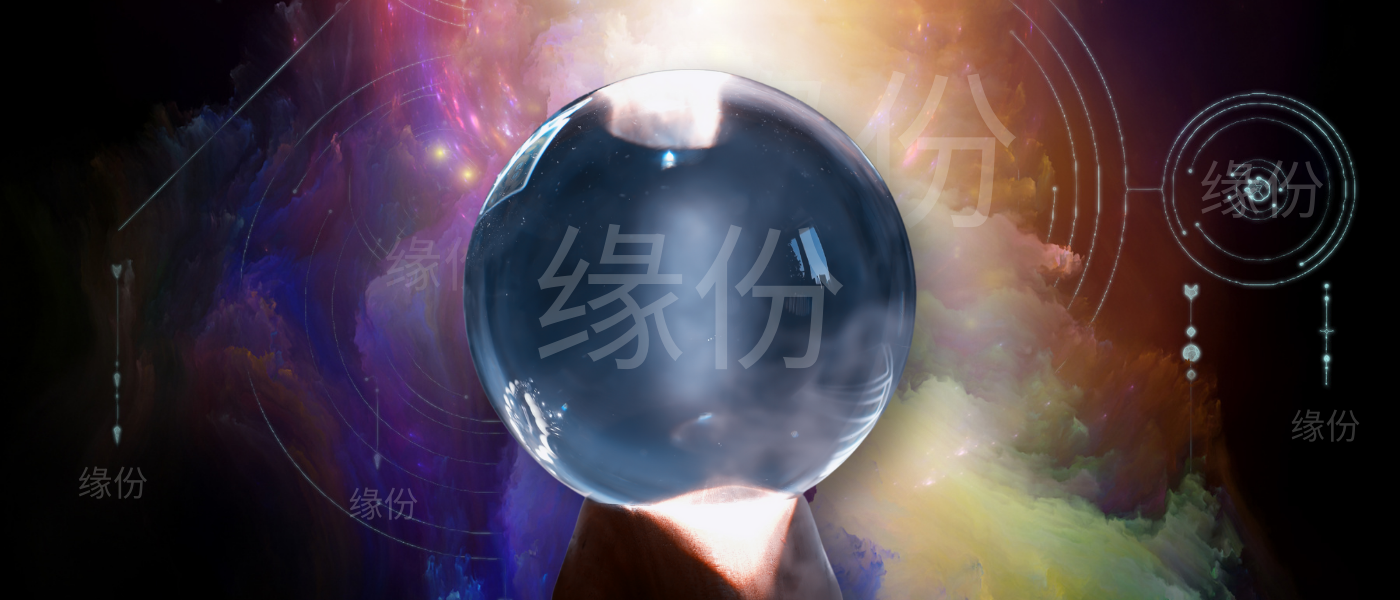Editorial Note: In June 2025, we published Issue 18: Radical Futurity. Each of the 14 incredible writers, artists, and activists below worked closely with our editorial team over a many-months process to get their piece in tip-top shape. Below, you’ll find some words from each of our editors about the pieces they worked on and what struck them most about them, whether it was a unique form, a memorable voice, or a nuanced approach to the topic. We’re incredibly grateful to our team for their care and attention — for making this issue really sing.

Tatiana Chaterji’s “Protest Song in Six Verses”
“There is a steady drumbeat and call to action that hums just below the surface throughout Tatiana Chaterji’s ‘Protest Song in Six Verses.’ Her lyric essay is a battle cry for sustained solidarity and a bold declaration of witness that captures the heartache of the ongoing genocide in Gaza; through her words, she renders visible the tapestry of global suffering that connects us all.”
— Joyce Chen, editor-in-chief
Samantha Stevens’ “Spell to Be Said Against Anxiety”
“I love this piece so very much! It functions as a call and response to the speaker’s body, staking out and fighting for peace in a world ruled by systems that disrupt our nervous systems. What drew me to this piece was how unabashedly magical it is — I’m in awe of how the language builds like organ music, effortlessly weaving in Jane Hirshfield’s lines and offering something deeply intimate and necessary in keeping with new and alternate visions of Radical Futurity.”
— Elizabeth Upshur, poetry editor
Derek Yen’s “API requests for present dystopia”
“Derek Yen’s work is technically brilliant — but most importantly, playful — twisting the heaviness of dystopia into code for the future. I was instantly taken by the unexpectedness of form in ‘API requests for present dystopia,’ where Derek turned simple lines of code into poetry for our radical future. In responding to our relationship with technology, this poem is both timely and timeless.”
— Stuti Pachisia, senior poetry editor
Lauren Peat’s “The Ones Who Walk Away”
“What happens when we are caught at the crossroads of continuing to serve a collective system that feels broken beyond repair and abandoning our individual commitment to creating change where and when it is needed most? Essayist and educator Lauren Peat explores this hauntingly existential dilemma with fierce compassion, looking to Ursula Le Guin’s timely and timeless false utopian short story ‘Those Who Walk Away from Omelas’ for answers.”
— Briana Gwin, senior prose editor
Isabella Higgins’ “The Chicken for Dinner”
“Isabella Higgins’ work is like feasting at a family table: an overlap of conversation, politics and climate realities, coming together over a chicken dinner. I savoured ‘The Chicken for Dinner,’ as it pulls apart a simple chicken dinner. The poem charts its political journey and future, all while retaining a warm hope — akin to the tender satisfaction of a home-cooked meal.”
— Stuti Pachisia, senior poetry editor
Aika Udagawa’s “Love Letter to M”
“There is something so ethereal about Aika’s writing, a timelessness that helps to carry their voice across time and space — from deep portals of burnout to past experiences organizing for Palestinian families to a haunting Parisian dreamscape — while also remaining intimate and sincere. Theirs is a voice that exudes curiosity, conviction, and care.”
— Joyce Chen, editor-in-chief
Jeff Joseph Katz’s “Why Are We Spiraling Around the Campfire?”
“Pulling from writings by Ursula K. Le Guin and Elizabeth Freeman, Jeff Katz constructs an incredibly layered and nuanced work that reminds us of the power of story, story structure, and storytelling. I was blown away upon my first reading of Jeff’s piece, and have continued to appreciate the depth of meaning and metaphor that he’s infused into each subsequent draft.”
— Joyce Chen, editor-in-chief
brenda Lin’s “On Inheritance”
“Through archive, interrogation, and reflection, brenda offers readers a powerful, layered glimpse into a critical inflection point for aging, multi-generational families — and asks us to reimagine what meaning we can derive from the objects and memories we choose to preserve, pass down, or pass over.”
— Briana Gwin, senior prose editor
Julio Cesar Diaz’s “Letter to My Future Archaeologist”
“What drew me to this poem was how playful it was on the surface while demonstrating the poet’s grasp of the inequalities and limitations of archeology. This poem uses excavation in a very literal way, creating a long poem driven by conversation as we see the many similarities between these characters. Humor is unequivocally needed in reimagining Radical Futurity, so it has been rewarding to help edit this piece these last few months. I hope audiences respond to its particular style of humor and all the pop culture references!”
— Elizabeth Upshur, poetry editor
Seelai Karzai’s “Growing Cilantro”
“On reading Seelai Karzai’s work, I knew immediately it had to be our closing poem. Seelai’s soft instructional poem on failed, yet renewed cilantro, is a gentle reminder that the future is a space of renewal and retries; we just have to wait for the next season.”
— Stuti Pachisia, senior poetry editor
Alex Wong’s “an atlas for winter”
“‘an atlas for winter’ is an exercise in cartography, an ever-expanding map that captures the full range of human feeling. Alex Wong’s writing moves between discovery, loss, fear, and ultimately, connection: the only way forward, as much as it is the way inward.”
— Stuti Pachisia, senior poetry editor
S. Isabel Choi’s “Bwah-ju-yoh”
“In this searing lyric essay, Isabel’s voice is a heartbeat pummeling through the multiverse of emotions erected from the wounds of fractured family dynamics. What place does individual maturity, morality, and agency have in relationships where filial piety and cultural traditions rule above all else? She prompts. And Is it ever truly too late to find out?”
— Briana Gwin, senior prose editor
Jeané D. Ridges’ “Porch Pull Up Ep. 204”
“The first thing that really caught my attention about Jeané’s piece was the voice of it; they render kinship and familiarity on the page in a way I hadn’t seen before. The close second thing was the inventiveness of the form, and the ways in which these two characters can simultaneously wade into the muck of scientific jargon and rib each other the way only old friends can.”
— Joyce Chen, editor-in-chief
Jake Rose’s “Revolution” and other poems
“What drew me to Jake’s work was how he uses color and the way he opens each poem like a thunderclap, startling and memorable in the best way possible. Each of these poems offers something special and exemplifies our theme of Radical Futurity. I’m biased, but what a joy to read, to ponder, and to return to over and over again”
— Elizabeth Upshur, poetry editor
Please join us in welcoming these 14 voices into the Seventh Wave fam, and be sure to spend some time with each piece over at The Magazine.




